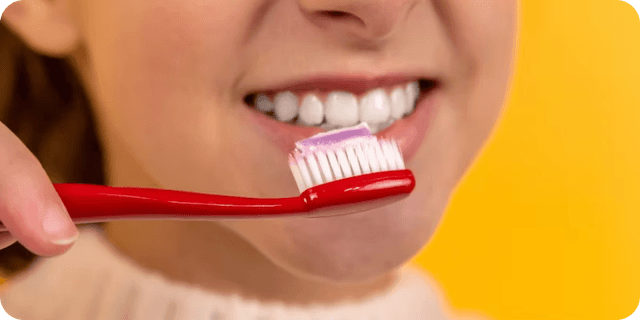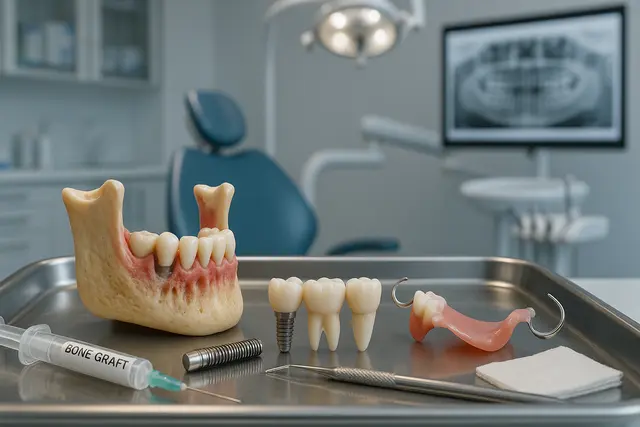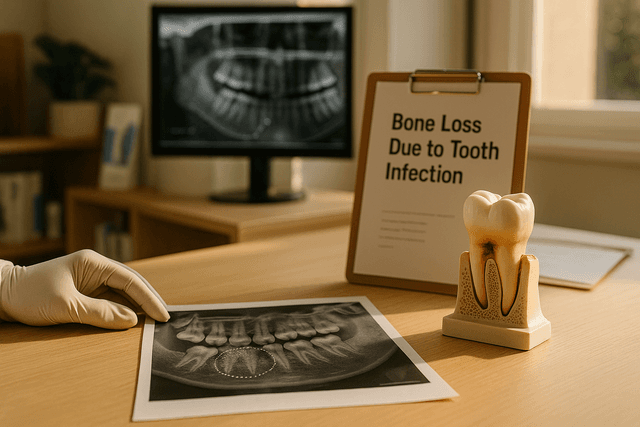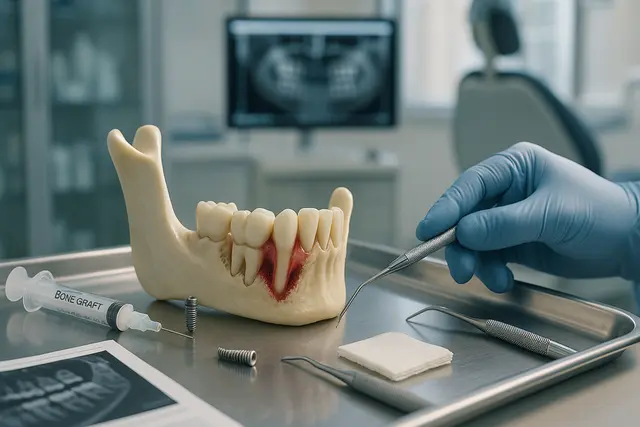Oral Health
6 min read
Sep 13, 2024
Pain-Free Solutions: Navigating Toothache Causes and Remedies
Explore the common causes of toothaches and discover effective remedies to alleviate pain and restore comfort to your daily life.

Toothache is pain that hugs your jaw like a vise grip and refuses to loosen. Most folks first notice it as a nagging throb when they sip coffee, but it can ramp up fast, turning a regular morning into a countdown to the next dose of ibuprofen. By the end of this guide you’ll know why toothache occurs, how to score temporary relief, and when professional dental treatment is the best move.
Toothache 101: Why the Ache Happens
A tooth might look like a simple block of enamel, yet inside the tooth hides a living system of pulp, blood vessels, and nerve endings. When decay is the most common intruder, it chews through the hard outer layer of the tooth and exposes sensitive parts of the tooth. The pain that originates there can travel through tiny tunnels in the pulp, fire up the nerves, and make the pain radiate to the ear, temple, or even the neck.
This referred pain means the tooth or the area around a tooth hurts, but the real trouble may be inside your tooth. Pain may feel dull today and sharp pain tomorrow; it can come and go or stick around like an unwanted houseguest.
Common Cause of Tooth Pain
Tooth decay isn’t alone on the suspect list. A broken tooth after a popcorn mishap, a cavity left unchecked, gum disease eating away at support, or wisdom teeth start pressing on nerves, all of them cause pain. Trauma from knocked out teeth, grinding at night, and even sinus pressure can make the pain worse. Because so many possible causes overlap, a dentist often needs an x-ray to see the part of the tooth you can’t.
Toothache Symptoms You Shouldn’t Ignore
Mild twinges are easy to shrug off, but watch for swelling around the tooth, fever, foul taste, or pain in or around the jaw that wakes you. These symptoms of a toothache hint at an abscess. A dental abscess can expand quickly, and without treatment the loss of a tooth is only the beginning; infection can spread to other areas. When pain is severe or you notice pus, antibiotics and pain control become urgent.
Dentist Detective Work
Seeing a dentist isn’t just about drills. Think of the visit as CSI for teeth and jaws. Your dentist will tap the tooth, shine light on cracks, or order an x-ray to spot an abscess or fractured root. They’ll explain treatment options ranging from a simple filling to a root canal, and in extreme cases tooth extraction. Professional dental treatment offers the best treatment because it erases the cause of the pain, not just masks it.
Causes Toothache: A Closer Look
Gum disease inflames tissue, loosens ligaments, and exposes roots. The affected area becomes extra sensitive, and bacteria dive in. Wisdom teeth create crowding and can trap food around the tooth behind them. Grinding puts pressure on the layer of the tooth nearest the pulp and can even crack enamel. Each cause of toothache has its own fix, which is why one-size-fits-all remedies for toothache rarely work long term.
Home Remedies Can Help
When you can’t get to the clinic immediately, several home remedies step in for temporary relief. Rinse your mouth with warm salt water to clean debris and soothe gums. Apply a cold compress to your cheek for fifteen minutes to numb the pain and reduce swelling. Take over-the-counter pain relievers such as ibuprofen to reduce pain and inflammation.
Clove oil dabbed on the portion of the tooth that aches can numb the pain and reduce throbbing for a bit. These remedies for toothache offer short-term comfort, but remember they do not cure the underlying problem.
Cold Compress and Other Quick Fixes
Cold constricts blood vessels, which slows inflammation and dulls sensation. To apply a cold compress wrap ice in a thin towel and press it outside the affected area. Pair this with a gentle saltwater rinse or over-the-counter dental gel for extra relief. Home remedies like these are ideal just before bed when pain and discomfort threaten sleep.
Root Canal, Antibiotic, and Extraction
If decay has bulldozed its way to the tooth pulp, a root canal clears infected tissue, fills spaces, and seals the tooth so ache doesn’t come roaring back. When infection spreads beyond the pulp, an antibiotic knocks down bacteria before or after the procedure. Occasionally a tooth has broken so badly that it cannot be saved. Tooth extraction removes the trouble source entirely and prevents infection from invading bone.
Wisdom Teeth and Late-Arriving Pain
Many adults sail through their twenties only to wake one morning with throbbing at the back. Wisdom teeth are notorious for creating pressure that causes toothache. When these molars crowd neighbors or grow sideways they can cause pain and inflammation, cavities, or cysts. Extraction often becomes the best route to ease toothache and protect nearby structures.
Grind Your Teeth? Stop the Nighttime Sabotage
Stress can make you clench or grind your teeth, a habit called bruxism. It squeezes the pulp, irritates ligaments, and chips enamel. A custom night guard cushions force, and stress-reduction techniques teach jaw muscles to relax. Without intervention, bruxism is a common cause of tooth pain that may come and go yet gradually crack enamel.
Prevent Toothache Before It Starts
Simple habits build strong defense. Brush your teeth twice daily, floss at night, and use a fluoride rinse if recommended. These steps keep teeth and gums as healthy as possible and prevent toothache from taking root. Limit sugary snacks that feed bacteria, and schedule cleanings twice a year. Prevent toothache isn’t flashy advice, yet it saves money, time, and misery.
Over-the-Counter Helpers and Pain Reliever Tips
Choose an over-the-counter pain reliever labeled for dental pain. Whether the pain nags or pulses, doses must follow the package. Never place aspirin directly on gums; it can burn tissue. If swelling is obvious, an anti-inflammatory like ibuprofen outperforms acetaminophen. Take over-the-counter pain medication with food and water to protect your stomach.
When to See a Dentist
Home tricks can ease toothache, but if pain returns when medicine wears off, see a dentist. Also book right away if you notice gum swelling, a cavity big enough to trap food, or if pain that originates in one tooth seems to spread. Quick care stops small problems from becoming expensive emergencies. Best of all, professional fixes can give lasting pain relief instead of the daily guessing game of which remedy might work.
Treatment for Toothaches: What to Expect
Modern dentistry offers laser fillings, same-day crowns, and digital impressions, so visits are faster and more comfortable. Your oral surgeon may start with numbing gel before local anesthetic, then clean decay, place a filling, or prep for a crown. Root canal sessions use fine files to reach the tooth pulp, clean infected tissue, and fill canals.
Antibiotic follow-ups squash lingering bacteria, while crowns restore strength. These toothache treatments may sound intimidating, yet most patients compare them to getting a deep filling rather than old-school horror stories.
Keep Pain Away for Good
Tooth pain can come back if cracked fillings, grinding, or gum disease aren’t monitored. Regular exams catch rough edges or tiny fractures before they cause pain. A quick polish or bite adjustment often solves discomfort that would otherwise make the pain flare later.
Final Word on Toothache and Pain Relief
Toothache is caused by many culprits, but decay tops the list. Once the cause of the pain is pinpointed, the solution becomes clear. If you follow these steps, maintain daily hygiene, use smart home remedies for temporary relief, and schedule timely visits, you’ll minimize chances of waking up at 3 a.m. with throbbing nerves. Should you feel that familiar pulse, apply a cold compress, rinse with salt water, and call your dentist in the morning. Oral health matters.
Pain-free days are possible, and they start with one decision: treat the tooth, don’t just treat the pain.
What Causes Toothaches and Why Do They Hurt So Much?
Toothaches often stem from tooth decay, gum disease, cracked teeth, or pressure from grinding. When the inner pulp of a tooth becomes exposed or inflamed, nerve endings fire pain signals that can radiate to the jaw, ear, or neck. The pain can vary in intensity and duration depending on the cause and how far the problem has progressed.
When Should I See a Dentist for Tooth Pain?
You should see a dentist if your toothache lasts more than a day or two, is accompanied by swelling, fever, a bad taste, or pain that wakes you up. These could be signs of an infection or abscess that requires immediate professional treatment to prevent serious complications.
What Home Remedies Can Help Relieve a Toothache Temporarily?
Home remedies like saltwater rinses, cold compresses, and over-the-counter pain relievers such as ibuprofen can reduce swelling and discomfort. Clove oil may also provide numbing relief. However, these are temporary solutions, seeing a dentist is essential to treat the root cause.
Can Grinding My Teeth Cause Tooth Pain?
Yes, grinding or clenching your teeth (bruxism) can lead to toothaches by wearing down enamel, irritating nerves, and causing small fractures. Over time, this can trigger persistent pain. A custom night guard and stress management can help protect your teeth from further damage.
Read Next
Related Posts

Oral Health
Tooth Replacement Options to Prevent Bone Loss
Losing a tooth isn’t just about appearance, it can have a lasting impact on your oral health, jawbone strength, and overall quality of life. When teeth go missing, the jawbone begins to shrink, which can change your bite, your facial structure, and even your confidence. Fortunately, modern dentistry offers several effective solutions to replace missing teeth and prevent further bone loss.
4 min read
Sep 26, 2025

Oral Health
Bone Loss Due to Tooth Infection Explained: What It Means for Your Oral Health
A tooth infection isn’t just about pain, it can quietly damage the tissues around a tooth and even erode the jawbone that supports your smile. This guide explains how infections start, why they can lead to bone loss, the warning signs to watch for, and the treatments that can stop the spread and rebuild lost support.
5 min read
Sep 25, 2025

Oral Health
Understanding Bone Loss in Teeth: Causes and Treatments That Work
Bone loss in teeth is a silent threat that can compromise your smile, facial structure, and overall oral health. While it often goes unnoticed in the early stages, it can lead to serious consequences if left untreated. Understanding what causes dental bone loss, and how to prevent or manage it, is key to maintaining a strong, healthy foundation for your teeth.
5 min read
Sep 25, 2025
Don’t have time to research every dentist around you?
See why 30k+ patients trusted us